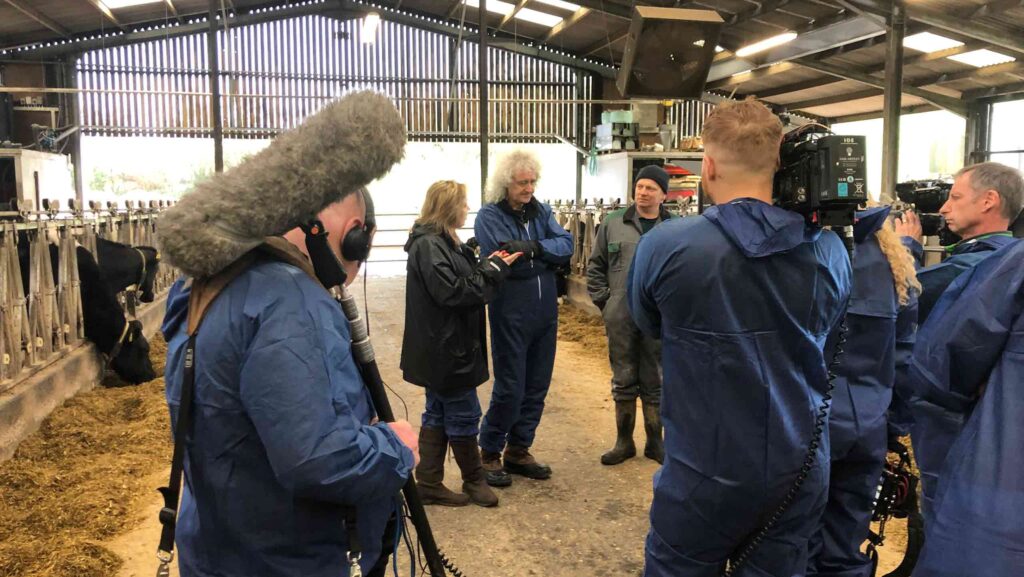Bovine TB experts have their say on Brian May’s documentary
 Brian May and the Save Me Trust's Anne Brummer © Save Me Trust
Brian May and the Save Me Trust's Anne Brummer © Save Me Trust Experts on bovine TB have been giving their verdict on Sir Brian May’s new BBC documentary on the disease, following a backlash from farming and veterinary groups.
The one-off programme, Brian May: The Badgers, the Farmers and Me, charts the Queen guitarist’s decade-long journey to understand the causes of TB in cattle and his strong opposition to badger culling.
Farming and veterinary groups have raised several concerns about the accuracy and representation of facts in the film surrounding bovine TB and its control, arguing that it failed to present a balanced view grounded in scientific evidence.
See also: AHDB to file formal complaint over Brian May’s TB documentary
Sir Brian’s documentary put forward claims that cattle are passing TB between themselves through their slurry, and that badgers are irrelevant in the spread of the disease.
The British Cattle and Veterinary Association and other experts insist a comprehensive, evidence-based approach to managing TB, involving multiple strategies such as testing, biosecurity and wildlife management, is essential for the Labour government to eradicate the disease in England by 2038 (see panel below).
Farmers Weekly asked prominent bovine TB experts for their views on the documentary, which aired on BBC2 on 23 August.
Broad claims
Gareth Enticott, a professor of human geography at Cardiff University and an expert on bovine TB, said the documentary used a single case study – Gatcombe Farm in east Devon – to make broad claims that badger culling is ineffective when tackling the disease.
But Prof Enticott said this argument was not supported by the data presented, and one case study was insufficient to draw such conclusions.
Although the documentary raised important issues on the value of “enhanced testing” for TB, it did not say anything about how it should be rolled out more widely and who should pay, he added.
TB situation ‘better, not worse’
James Wood, a professor at Cambridge University who has carried out research into bovine TB for the past 15 years, said Sir Brian and vet Dick Sibley claimed the bovine TB situation was getting worse in Devon and England more broadly, when in fact it had got considerably better in the areas where badgers had been culled.
“To ignore the proven role of wildlife in transmitting to cattle is grossly irresponsible,” he added.
There was clear evidence that the rates of disease in the High Risk Area of England had substantially declined over the past six years, Prof Wood said.
Malcolm Bennett, a professor of zoonotic and emerging diseases at Nottingham University, said badgers were “part of the problem, but not the biggest part”.
“The documentary’s central argument that bovine TB is primarily a cattle disease that spreads largely within and between herds, sometimes over long distances through cattle movements, is generally agreed,” he added.
Prof Bennett said the situation was compounded by the poor diagnostics currently used in cattle, which allowed TB infections to spread undetected.
Four key criticisms of the documentary
The British Cattle and Veterinary Association (BCVA) made four key criticisms of the programme:
- Failure to present latest evidence The programme did not adequately reference the most recent evidence supporting the role of badgers in TB transmission and the effectiveness of culling, such as the findings in the Downs (2019) and Birch (2024) reports
- Misleading information It incorrectly stated that the skin test sensitivity was 50%, whereas it ranges from 50-80% with an average of 80% in England
- Underrepresentation of scientific consensus The programme did not emphasise that bovine TB control needs a holistic approach, including culling, enhanced testing and improved biosecurity. The omission of newer data on culling policies missed the opportunity for a more informed discussion
- Impact of misinformation The BCVA said it was concerned that the emotive language and selective presentation of data could harm public understanding and trust, potentially affecting both policy decisions and the mental health of farmers dealing with TB.
